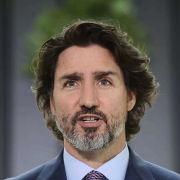Trudeau has Weakened Canada — and by Extension, the Entire Free World
At a time when the western world desperately needs some backbone, Canada seems to be swaying. It appears to have moved away from its long-term commitment to protect our now wobbling western civilization. This can be seen in how Canada deals with its defense responsibilities, its flaccid stand on Israel and in its belief in the value of its own existence.
These phenomena are all too common in the western world, including the United States and much of the European Union. The causes are familiar. They include the incessant kowtowing to nihilistic progressive ideologies that dominate the media and undermine the very legitimacy of the country. These attitudes underpin a desperate attempt to stay effectively neutral in the conflicts now sweeping the world and an unwillingness to bear the burdens inherent in being a strong ally.
Canada, like other countries, has its historical faults, particularly in regard to First Nations, the treatment of Quebec and racism towards Asian and other migrants. In Canada, and even more so in the United States, these are original sins inherent in any colonial venture. Yet for generations, Canada has been an ever more welcoming place, particularly for millions of newcomers, who continue to seek residence and often thrive.
Canada’s importance as a well-functioning liberal democracy is nothing new. The country has long been willing to put itself on the line to resist autocracy. This was demonstrated by the extraordinary bravery of Canadians in the two world wars, which cost the country over 100,000 lives, and consistent support for the West in the successful contest with the Soviet Union. Sadly, this is not so much the case anymore.
Much of this stems from the corrosive impact of “anti-colonial” ideology, which leads some academics and progressive activists to suggest that the country itself is illegitimate, referring to it as “so-called Canada.” Sadly, Prime Minister Justin Trudeau also seems to see Canada not as a country among other countries, but what the New York Times described as “a new kind of state,” one that is “post-national.” As Politico noted last week, Trudeau has now “lost his grip” on the Canadian electorate, who might see their country as something more.
Read the rest of this piece at National Post.
Joel Kotkin is the author of The Coming of Neo-Feudalism: A Warning to the Global Middle Class. He is the Roger Hobbs Presidential Fellow in Urban Futures at Chapman University and Executive Director for Urban Reform Institute. Learn more at joelkotkin.com and follow him on Twitter @joelkotkin.
Photo: Justin Trudeau via Flickr, in Public Domain.



